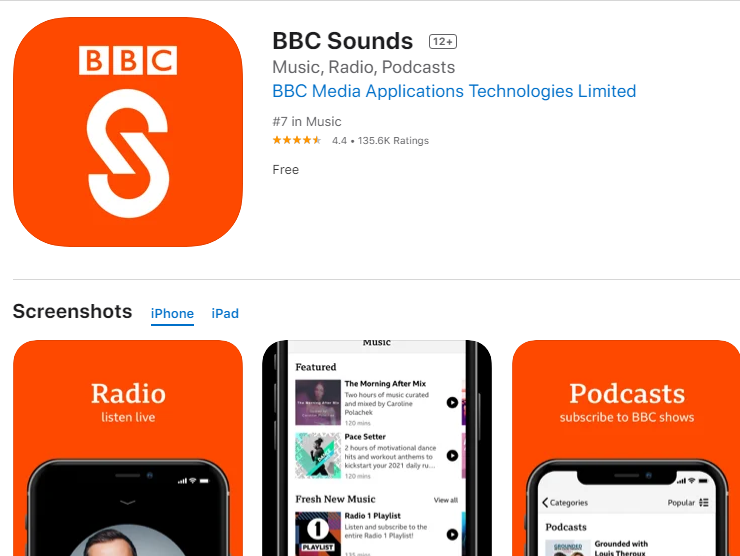
BBC Sounds is not having a “significant adverse impact on fair and effective competition” in the podcast and radio market, Ofcom has said, despite concerns from commercial broadcasters.
The broadcast regulator has carried out a review of BBC Sounds’ market position and published its provisional view that in fact, commercial radio has done better at attracting online listeners than the BBC.
Ofcom said the market still benefits from a wide range of non-BBC content, the producers of which are able to generate revenue.
But the regulator said it will continue to monitor the development of the audio service, adding that the BBC should publish more information about how listeners use the service, which hosts all live and on-demand BBC radio and podcasts and was launched in 2018 to attract younger listeners.
Wireless, the audio arm of Rupert Murdoch’s Times and Sun publisher News UK, had told Ofcom the growth of BBC Sounds was impeding the independent podcast sector.
It claimed this could be why UK commercial speech radio and podcast companies were not seeing profits and investment on the same level as international markets such as the US.
[Read more: Why popularity of podcasts is finally turning into revenue for publishers]
Ofcom, however, found advertising revenue from UK podcasts was up by 66% year-on-year in 2020. “This does not support the conclusion that the presence of BBC content is stifling the development of the UK podcast advertising market,” it said.
Wireless argued that BBC Sounds was “perpetuating an unequal playing field in UK audio production, broadcasting and distribution” as it called for operating licence conditions to define the scope and remit of Sounds.
“BBC Sounds has become an effective walled garden for UK listeners, giving rise to deficits in diversity, choice and competition across the UK audio ecosystem,” Wireless said.
ITN, which produces ITV News, Channel 4 News and 5 News, said it currently sees many opportunities to expand its podcast offering including Krishnan Guru-Murthy’s Ways to Change The World, which has about 35,000 listeners per weekly episode, and 5 News political editor Andy Bell’s How did we get here? which reaches up to 20,000 people per episode.
But ITN said the market can only continue to grow if one platform does not dominate.
“The ability to reach large audiences external to the BBC’s walled garden is crucial if the podcasting market is going to continue to develop commercially,” ITN said. “As both a producer and publisher a pluralistic distribution market where audiences can find content in as many places as possible is an ideal situation.
“BBC Sounds should be just one piece of the jigsaw rather than the complete picture and any future policy moves should further stimulate the market.”
ITN said if BBC Sounds, which has around 4m weekly signed-in users, were to achieve a market-leading position the next questions to be answered would be over how it could carry third-party content on its platform.
“If this was a strategy pursued by BBC Sounds the main considerations for ITN would be: how the BBC would propose to choose the best third-party content, how prominence would be balanced between BBC and third-party content and the ability for third-parties to monetise their content through advertising.
“Without finding answers to these questions the business model for podcasting would be at risk of being destroyed.”
Wireless also suggested its feared “walled garden” effect could be mitigated by having third-party radio and audio content signposted across the BBC’s platforms.
An agreement of this effect was originally put in place in 2019 for Wireless to list its radio services, which include Talkradio and Virgin, on BBC Sounds but the public service broadcaster withdrew the plan after other radio groups pulled out.
Wireless has now said it is not aware of any plans from the BBC to revisit this proposal and considers this to “constitute a missed opportunity for the BBC to have engaged positively with the independent audio sector”.
LBC owner Global Radio said it was “unacceptable” the BBC was able to operate Sounds outside the licensing framework.
It said: “We know that both online radio and podcast markets are growing and are predicted to continue to do so.
“It is therefore vital that proper regulation for BBC Sounds is put in place now to avoid its already dominant position from discouraging investment and stifling future competition.”
A BBC radio spokesperson said: “We welcome Ofcom’s view that BBC Sounds is not having a significant adverse impact on fair and effective competition.
“BBC Sounds is central to our audio strategy so that we can serve all our audiences, and we’ll continue to openly share our plans for it with our colleagues in the industry and report on its performance.”
Email pged@pressgazette.co.uk to point out mistakes, provide story tips or send in a letter for publication on our "Letters Page" blog
